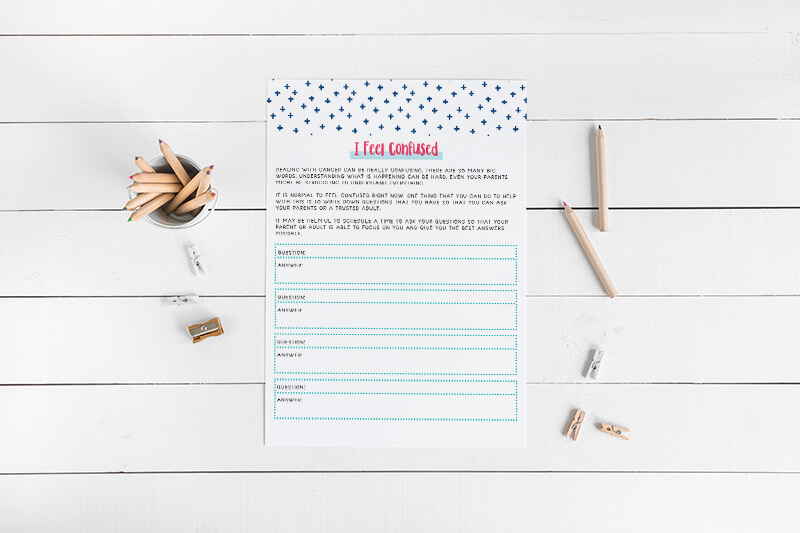Being Diagnosed with Cancer as a Mom or Dad to Young Kids is Terrifying
When I was diagnosed with breast cancer, one of my first thoughts was, how in the world am I going to tell my boys. I knew that I needed to tell them as they could tell that something was obviously wrong with me due to my anxiety and other emotions that were just uncontrollably spilling out during those early days.
With my background in counseling and working with kids who had gone through trauma, I was particularly aware that I wanted to do this “the right way”. I researched what to say, I worried about whether they would understand and how to make it less scary for them. In the end though, it was sort of like ripping off a band-aid. I just had to take a deep breath and do the best I could.
It was an interesting conversation. My 7 year old just wanted to know if I would be okay and was very interested in what he could do to help me feel better. Once he heard that I would be okay, he immediately went away to color a picture for me and went on with his day. On the other hand, my 9 year old was really worried. He had lots of questions and wanted to know details on what would happen, what cancer was, if it would happen to him, and if I would be okay. He struggled with all kinds of emotions including fear, anger, and sadness during that conversation as well as all throughout my treatment and recovery.
Here are some tips from my cancer talk that I hope will be helpful for you if you are facing down this conversation with your own kiddos:
Do your research
As a parent, your main goal is to protect and love your children. You have probably not ever prepared for or thought through how you would give your kids devastating news. Luckily there are resources out there that give some great pointers on how to talk to your kids about cancer in age appropriate ways.
One of the things that was very helpful for me is that I print off discussion tips from a local agency and thought through how I would put them into my own words prior to our conversation. You can download their discussion tips here: https://www.wondersandworries.org/for-parents/illness-discussion-tips/
It is also helpful to think through how you want to answer some of the big questions that you don’t have answers to. Having to talk to your kids about whether you are going to die or whether you are going to get really sick from chemo is just so hard. Having thought through an answer to these questions in kid appropriate language helped me feel a little less anxious about those questions.
Set the stage to keep communication open
Let’s be honest, you probably don’t have all the details about your cancer and treatment plan prior to talking with your children. I know how hard the ambiguity of those early days are and trying to bring your kids into the loop when you are spinning with uncertainty can be quite the challenge.
The good news is that this conversation will not be the one and only talk you will have with your kids. The best thing you can do is to set the stage for open and ongoing communication. Let them know that you don’t know everything yet. Together, you can decide on what will work best for communicating updates going forward. Depending on your children’s age and temperament, they may need more structured conversations with lots of details, or they may need to know that they can ask questions anytime they want.
Give Your Kids Resources for dealing with their emotions
It is helpful to come into the conversation with a few tools for your kids to help them figure out how to talk with you about your cancer as well as about how they are feeling going forward. Just like you, they will have a variety of emotions and have probably not ever had to deal with something this big and scary before.
One great resource for this is the Interview Worksheet that is found in the Brave Guide to Cancer. This worksheet gives kids a structured way to put their questions into words and get answers so that they can feel a little less confused about everything. You can download the worksheet in the Parenting Resource Library for free or learn more about the Brave Guide to Cancer by clicking here which is packed full of resources and tools for kids whose parents have cancer.
Download your free interview worksheet in the Parenting Resource Library.
Another really great tool for your kids is to help them identify their support team so that they know who they can talk to. Your child’s support team could include friends, neighbors, pastors, teachers, counselors, etc. This team will be important for them in the days ahead as you will have times that you will not be able to be there for your kids like you normally are.
Together, you can decide how you will let the support team know about your cancer – will your child tell them, or will you reach out to let them know what is going on. You may even want to talk about what and when they might want to talk to each person on their support team. (For example, they may want to talk to a friend when they are feeling sad, or they may want to know that they can talk to a school counselor if they are having a tough day at school dealing with everything.)
Ask for Help When You Need It
There will be times, going forward, that you and your kids will need help working through the emotions, figuring out what is going on, and just getting through life. While a lot of my own families grieving, processing and moving on has taken place with each other, both of my boys have needed more support than I, alone, was able to give them.
For my younger son, his school counselor has been his safe space. He knows that it is okay to go to her when he is sad, scared or just needs a distraction from things when they get to be too much. My older son was able to go to Camp Kesem this summer which is a non-profit camp for kids whose families have been impacted by cancer.
While in the early days of your diagnosis, it may feel overwhelming to try to plug your kids into outside support, know that there are resources available for them when they need it. In the meantime, keep breathing, hug each other often, and know that I am sending you so much love and healing thoughts.

